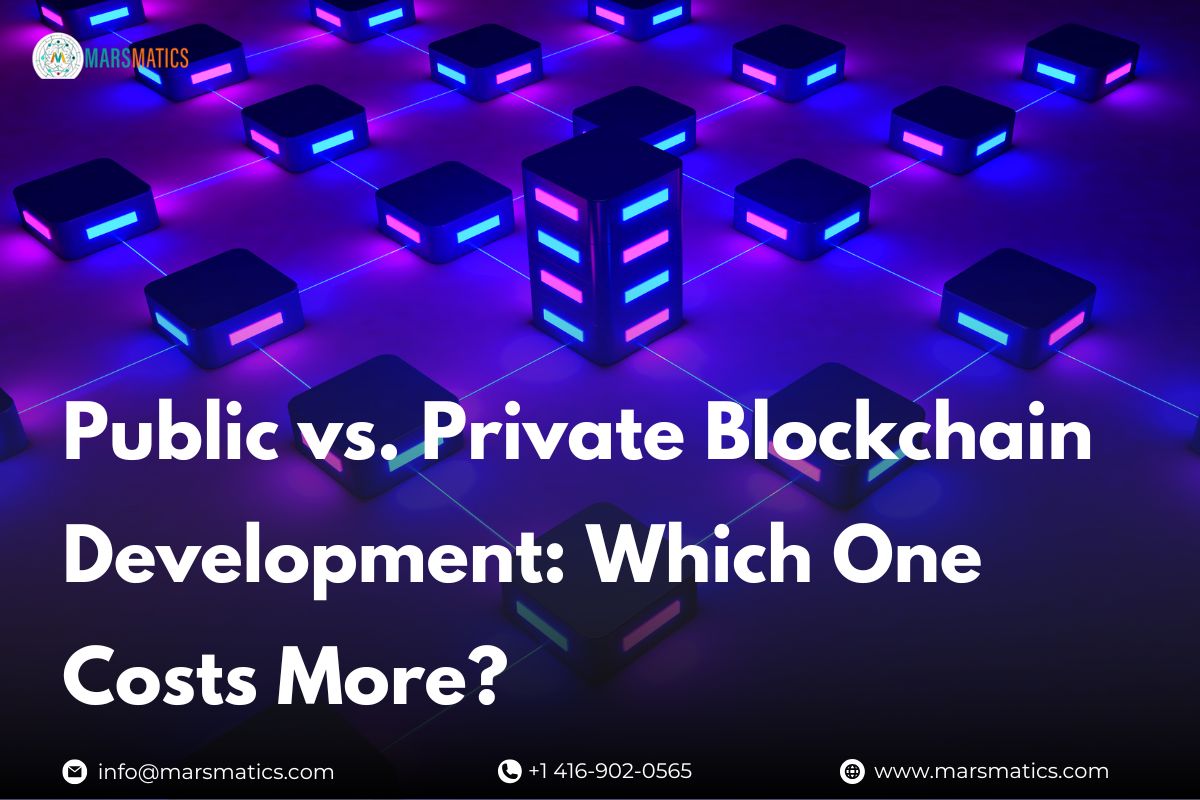Public vs. Private Blockchain Development: Which One Costs More?
Blockchain technology is reshaping industries, from finance and healthcare to supply chains and beyond. But when it comes to choosing between public vs. private blockchain development, cost is a major deciding factor. This blog will explore the difference between public vs. private blockchain, analyze the key cost factors, and help you determine which option is more cost-effective for your business.
What is a Public Blockchain?
A public blockchain is a decentralized, open network where anyone can participate. It operates on a distributed ledger, meaning all transactions are recorded transparently and secured using cryptographic principles.
Also Read: Top 10 blockchain development platforms
How blockchain works in a public network:
- No single entity controls the network; instead, it is maintained by multiple participants (nodes).
- Every transaction is visible to all users, ensuring trust.
- Transactions are validated using consensus mechanisms like Proof of Work (PoW) or Proof of Stake (PoS).
- Examples: Bitcoin, Ethereum, Solana – These are well-known public and private blockchain examples that power various decentralized applications.
Pros of Public Blockchains:
✔️ Fully decentralized and censorship-resistant
✔️ High transparency and trustworthiness
✔️ Strong security with cryptographic protection
Cons of Public Blockchains:
❌ Slower transaction speeds due to high network activity
❌ High transaction (gas) fees
❌ Energy-intensive (PoW-based networks like Bitcoin)
What is a Private Blockchain?
A private blockchain is a permissioned network where only authorized participants can access and validate transactions. Unlike public blockchains, private blockchains are often used by enterprises for secure and efficient business operations.
How blockchain works in a private network:
- Only selected participants can join the network.
- Limited nodes make processing transactions quicker.
- Controlled permissions allow enhanced security and compliance.
- Examples: Hyperledger Fabric, Corda, Quorum – These public and private blockchain examples are widely used in industries like banking and supply chain management.
Pros of Private Blockchains:
✔️ Faster transaction speeds and scalability
✔️ Lower energy consumption compared to public blockchains
✔️ Greater control over data security and compliance
Cons of Private Blockchains:
❌ Centralized control reduces trust and transparency
❌ Higher initial development and maintenance costs
❌ Limited participation, reducing decentralization benefits
Cost Factors in Blockchain Development:
Whether you choose a public or private blockchain, several factors influence the cost of development:
1️⃣ Infrastructure & Hosting Costs:
- No need for dedicated infrastructure; transactions run on an existing network like Ethereum or Solana.
- Requires dedicated servers, cloud hosting, and network setup.
2️⃣ Development Complexity:
- More complex applications, such as smart contracts and decentralized apps (DApps), increase costs.
- Public blockchains allow developers to build on existing platforms, while private blockchains require custom coding.
3️⃣ Security & Compliance:
- Security is built-in but requires smart contract audits to prevent vulnerabilities.
- Higher compliance costs to meet industry regulations (e.g., GDPR, financial security laws).
4️⃣ Maintenance & Upgrades:
- Regular updates from the open-source community but limited control.
- Custom maintenance and ongoing security updates add to long-term costs.
Cost Comparison: Public vs. Private Blockchain:
| Cost Factor | Public Blockchain | Private Blockchain |
| Development Costs | Lower initial costs as developers can build on existing networks. | Higher costs due to setting up a customized infrastructure. |
| Transaction & Network Fees | Requires gas fees for every transaction (e.g., Ethereum gas fees can be expensive). | Minimal transaction costs since transactions are managed internally. |
| Scalability & Performance Costs | Scaling requires Layer 2 solutions (like Polygon), adding extra costs. | Better scalability, but additional servers increase infrastructure costs. |
| Security & Compliance Costs | Built-in security, but expensive smart contract audits are needed. | Custom security measures add extra development and compliance expenses. |
| Maintenance & Upgrade Costs | Fewer maintenance costs, but upgrades depend on the open-source community. | Continuous updates and technical support increase long-term costs. |
Also Read: Blockchain development cost
Which Blockchain is More Cost-Effective?
When considering public vs. private blockchain development, the right choice depends on your business needs.
| Factor | Public Blockchain | Private Blockchain |
| Initial Development Cost | Lower | Higher |
| Transaction Fees | Higher | Lower |
| Scalability Costs | Higher (requires Layer 2 solutions) | Lower |
| Security & Compliance Costs | Lower (network security included) | Higher (custom security needed) |
| Maintenance & Upgrades | Lower (open-source updates) | Higher (ongoing maintenance required) |
✔️ Choose a Public Blockchain if: You need decentralization, global accessibility, and lower initial costs.
✔️ Choose a Private Blockchain if: You require speed, enterprise security, and full control over the network.
Conclusion:
Both public and private blockchain solutions come with unique costs and benefits. If you’re looking for a fully decentralized network with lower upfront costs, public blockchains like Ethereum are a great choice. But if you need better control, security, and scalability, a private blockchain like Hyperledger might be the right investment. Before making a decision, carefully assess the difference between public vs. private blockchain, consider your long-term business goals, and consult blockchain experts to optimize costs.
FAQs
What is the main cost difference between public and private blockchains?
Public blockchains have lower development costs but higher transaction fees, while private blockchains require more infrastructure investment but have lower operational costs.
Is a private blockchain more secure than a public blockchain?
Private blockchains offer controlled access and higher security for enterprise use, but public blockchains provide decentralized security mechanisms.
Which blockchain type is better for startups: public or private?
Startups often choose public blockchains due to lower initial costs and existing infrastructure, but private blockchains can be preferable for regulatory and security reasons.
How much does it cost to develop a private blockchain from scratch?
The cost varies based on complexity, but a fully functional private blockchain can range from $50,000 to $500,000+, depending on security, infrastructure, and development needs.








